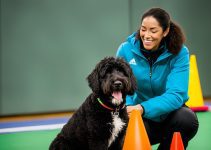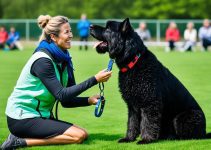Miniature Pinscher training can be a challenge due to their headstrong and energetic nature. However, with the right techniques and tips, you can unlock their potential and have a well-disciplined and obedient dog. In this section, I will provide valuable insights into effective training methods for Miniature Pinschers, including obedience training and behavior training.
Miniature Pinscher Training
- Consistency and patience are key when training a Miniature Pinscher.
- Establish command association early on to ensure obedience.
- Positive reinforcement is a highly effective training method.
- Puppy training should start as soon as you bring your Miniature Pinscher home.
- Respect training is essential for building a strong bond with your Miniature Pinscher.
The Importance of Command Association and Obedience
When it comes to Miniature Pinscher training, establishing command association and ensuring obedience are crucial. By teaching your dog to associate specific behaviors with words or commands, you can effectively communicate your expectations and make them obey consistently.
In this section, I will discuss the importance of command association and obedience in Miniature Pinscher training. We will explore effective training methods, such as positive reinforcement and clear communication, that will help you achieve the best results with your Miniature Pinscher.
Why Command Association is Vital
Command association plays a key role in Miniature Pinscher training. When you consistently use specific commands for desired behaviors, your dog will learn to associate those commands with the corresponding actions. For example, using the command “sit” every time you want your Miniature Pinscher to sit will help them understand what is expected of them.
Consistency is essential when establishing command association. Make sure to use the same command for a specific behavior every time, and avoid using different words for the same action. This will prevent confusion and reinforce the association between the command and the desired behavior.
Ensuring Obedience
Along with command association, achieving obedience is vital for effective Miniature Pinscher training. Obedience ensures that your dog follows your commands promptly and willingly.
Positive reinforcement is one of the best training techniques for promoting obedience in your Miniature Pinscher. By rewarding your dog with treats, praise, or playtime when they obey a command, you can motivate and encourage them to continue obeying in the future.
Clear and consistent communication is another crucial aspect of ensuring obedience. Use a firm yet gentle tone when giving commands, and avoid any confusion by providing clear instructions. Consistency in your training methods and expectations will help your Miniature Pinscher understand what is required of them.
Puppy Training for Miniature Pinschers
Miniature Pinscher training should begin as soon as you bring your Miniature Pinscher puppy home. It is important to establish good habits and behaviors from an early age. In this section, I will outline essential aspects of puppy training that will set a solid foundation for your Miniature Pinscher’s future.
Housebreaking
Housebreaking is one of the first and most crucial training steps for your Miniature Pinscher. To prevent accidents and teach your puppy where they should relieve themselves, establish a consistent routine. Take your puppy outside to designated potty areas after meals, playtime, and naps. Reward them with praise and treats when they eliminate in the right spot. Be patient and consistent during the housebreaking process, as accidents may occur in the early stages.
Crate Training
Crate training is an effective method to provide your Miniature Pinscher with a safe and secure space. Introduce the crate gradually, making it a positive and comfortable environment with soft bedding and toys. Use treats and praise to encourage your puppy to enter the crate willingly. Start with short periods of time inside the crate and gradually increase the duration. This will teach your puppy to view the crate as their den and to hold their bladder and bowels when necessary.

Basic Obedience
Basic obedience training is essential for your Miniature Pinscher’s development and safety. Teach your puppy basic commands such as sit, stay, come, and down. Use positive reinforcement techniques such as treats, praise, and a clicker to reward good behavior. Keep training sessions short and fun to maintain your puppy’s interest and motivation. Consistency and repetition are key to successfully instilling obedience in your Miniature Pinscher.
By focusing on housebreaking, crate training, and basic obedience, you will lay a solid foundation for your Miniature Pinscher’s training journey. Remember to be patient, consistent, and positive throughout the process. With time and dedication, your Miniature Pinscher puppy will become a well-behaved and obedient companion.
Respect Training for Miniature Pinschers
Building respect and establishing yourself as the leader is vital in training Miniature Pinschers. As a responsible dog owner, it is your role to guide and teach your Miniature Pinscher proper behavior and obedience. Respect training focuses on creating a balanced and respectful relationship with your dog, encouraging him to listen and follow your commands.
To effectively train and lead your Miniature Pinscher, it’s important to employ techniques that promote respect and obedience. Consistency is key, as dogs thrive on routine and structure. By consistently reinforcing desired behaviors and discouraging unwanted ones, you can shape your Miniature Pinscher’s behavior in a positive way.
One of the most powerful tools in respect training is positive reinforcement. This involves rewarding your Miniature Pinscher with treats, praise, and affection when he exhibits the desired behavior. Miniature Pinschers are intelligent dogs who respond well to positive reinforcement, making it an effective training method. Remember to be patient and consistent, rewarding your dog immediately after he performs the desired action.
Clear communication is another essential aspect of respect training. Use precise commands and cues when training your Miniature Pinscher, ensuring that he understands what you expect from him. Consistency in your tone of voice and body language will further reinforce your commands.
Key Techniques in Respect Training:
- Establish a daily routine and stick to it. Dogs thrive on predictability, and a consistent routine will help your Miniature Pinscher understand what is expected of him.
- Use positive reinforcement to reward desired behaviors, such as sitting, staying, and coming when called. This will motivate your Miniature Pinscher to repeat these behaviors in the future.
- Set clear boundaries and enforce them consistently. This will help your Miniature Pinscher understand what behaviors are acceptable and what is not.
- Practice regular obedience training sessions to reinforce commands and strengthen the bond between you and your Miniature Pinscher.
- Provide mental and physical stimulation to prevent boredom, as a stimulated dog is more likely to display good behavior.
Respect training is an ongoing process that requires patience, consistency, and dedication. By implementing these techniques and maintaining a positive and respectful relationship with your Miniature Pinscher, you can effectively train him to be a well-behaved and obedient companion.

Behavior Problem Solutions for Miniature Pinschers
Training a Miniature Pinscher can sometimes come with its fair share of behavior problems. In this section, I will address common issues that may arise during the training process and provide you with tips and techniques to solve them effectively. By implementing these solutions, you can ensure a harmonious relationship with your Miniature Pinscher.
Aggression
Aggression can be a challenging behavior problem to deal with. It is important to understand the underlying causes of aggression in Miniature Pinschers, which may include fear, territoriality, or resource guarding. To address this issue, consider seeking the assistance of a professional dog trainer or behaviorist who specializes in aggression. They can help you develop a customized training plan to manage and modify your Miniature Pinscher’s aggressive behavior.
Excessive Barking
If your Miniature Pinscher tends to bark excessively, it is essential to identify the triggers and work on desensitization and redirection techniques. For instance, distracting your dog with a toy or engaging them in a different activity when they start barking can help redirect their focus. Additionally, providing mental and physical stimulation through regular exercise and interactive toys can help reduce excessive barking.
Inappropriate Chewing
Miniature Pinschers are known for their energetic nature, which can sometimes manifest as destructive chewing behavior. To address this issue, ensure your Miniature Pinscher has plenty of appropriate chew toys and engage them in structured playtime. Additionally, practicing crate training can help manage chewing behavior when you are unable to supervise your dog closely.
Promoting Positive Socialization
Socialization plays a crucial role in shaping your Miniature Pinscher’s behavior and ensuring they are well-adjusted to various environments. Start socializing your Miniature Pinscher at a young age by exposing them to different people, animals, and situations. Gradually increase the level of difficulty and provide positive reinforcement for calm and appropriate behavior during socialization exercises.
Leash Training Tips
Leash training is essential for keeping your Miniature Pinscher safe and well-behaved during walks. Begin by introducing your dog to a comfortable, properly-fitted harness or collar and a sturdy leash. Practice loose leash walking by rewarding your Miniature Pinscher for walking beside you without pulling. Consistency and patience are key when leash training, so make sure to dedicate regular training sessions to reinforce good leash manners.
Remember, solving behavior problems in Miniature Pinschers requires patience, consistency, and understanding. By implementing the tips and techniques mentioned above, you can effectively address behavior issues and create a happy and well-behaved companion.
Finding the Right Training Help for Miniature Pinschers
When it comes to training your Miniature Pinscher, it’s essential to have the right resources and guidance. Whether you’re a first-time dog owner or looking to enhance your dog’s skills, finding the right training help is crucial. Here are some options to consider:
Hiring a Professional Trainer
One of the most effective ways to train your Miniature Pinscher is to hire a professional trainer. They have the knowledge and expertise to assess your dog’s behavior and create a personalized training plan. A professional trainer can guide you on obedience training, leash training, and house training a Miniature Pinscher. They provide valuable insights and techniques to help you overcome any training challenges you may face.
Attending Obedience Classes
Another great option for training your Miniature Pinscher is to attend obedience classes. These classes offer a structured learning environment where you and your dog can interact with other owners and their dogs. Obedience classes provide socialization opportunities, teach basic commands, and help improve your dog’s behavior. Look for reputable dog training schools or community centers that offer obedience classes specifically for Miniature Pinschers.
Reading Books and Online Resources
If you prefer self-paced learning, there are plenty of books and online resources available on dog training for Miniature Pinschers. Look for reputable authors and trainers who specialize in small breed dogs. These resources provide step-by-step guides, training techniques, and useful tips to help you train your Miniature Pinscher effectively. Remember to choose resources that align with positive reinforcement and reward-based training methods for the best results.
Watching Training Videos
Training videos can be a great visual aid in your Miniature Pinscher training journey. You can find a wealth of training videos online that cover various topics such as obedience training, leash training, and house training. Watch videos from reputable trainers who demonstrate effective techniques and provide valuable insights. Visual demonstrations can often make it easier to understand and implement training methods with your Miniature Pinscher.
No matter which training help option you choose, prioritizing consistency, patience, and positive reinforcement will lead to the best results. Remember that each Miniature Pinscher is unique, so it’s important to tailor your training methods to their specific needs and personality.
Now that you have an understanding of different training help options, let’s move on to the conclusion and wrap up all the essential tips and techniques for effective Miniature Pinscher training.
Conclusion
Training a Miniature Pinscher requires patience, consistency, and understanding. Throughout this article, I have provided valuable insights and techniques for effective Miniature Pinscher training. By following the tips and methods discussed, you can unlock your dog’s potential and build a strong bond based on respect and obedience.
Remember, Miniature Pinscher training is a continuous process that requires dedication and effort. Consistency in your approach and positive reinforcement techniques will yield the best results. By setting clear boundaries, reinforcing desired behaviors, and addressing any behavior problems promptly, you can shape your Miniature Pinscher into a well-behaved and obedient companion.
Whether it’s obedience training, behavior problem solving, or puppy training, the key is to establish yourself as the leader and mentor for your Miniature Pinscher. The training journey may have its challenges, but the rewards of a well-trained and well-behaved Miniature Pinscher are truly worth it. So, embark on this Miniature Pinscher training adventure with enthusiasm, and enjoy building a harmonious relationship with your Miniature Pinscher.
FAQ
What are some effective training methods for Miniature Pinschers?
Effective training methods for Miniature Pinschers include positive reinforcement, clear communication, and consistency. These methods help to establish command association and ensure obedience.
When should I start training my Miniature Pinscher puppy?
Training should begin as soon as you bring your Miniature Pinscher puppy home. Early training is essential for housebreaking, crate training, and basic obedience.
How can I establish myself as the leader during training?
Building respect and establishing yourself as the leader is vital in training Miniature Pinschers. Techniques such as consistency, positive reinforcement, and clear communication can help you effectively train and lead your Miniature Pinscher.
What should I do if my Miniature Pinscher has behavior problems?
If your Miniature Pinscher has behavior problems such as aggression, excessive barking, or inappropriate chewing, it’s important to address them promptly. Tips and techniques for solving behavior problems and promoting positive socialization and leash training will be covered in this section.
How can I find the right training help for my Miniature Pinscher?
There are various resources available to help with training your Miniature Pinscher, such as hiring a professional trainer, attending obedience classes, reading books, or watching training videos. This section will guide you in finding the most effective training methods for your Miniature Pinscher’s specific needs.






